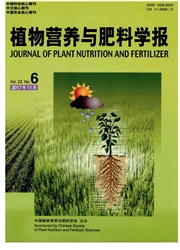

 中文摘要:
中文摘要:
采用为期62d的实验室恒温(28±1)℃培养方法,研究了土壤水分和植物残体对紫色水稻土有机碳矿化的影响。结果表明,紫色水稻土有机碳矿化速率在培养30d后基本达到稳定,好气条件下土壤有机碳累积矿化量高于淹水条件,且差异达到极显著水平。用一级动力学方程对植物残体的矿化速率进行拟合表明,好气条件下,植物残体的分解速率常数(k值)大小顺序为蚕豆秸秆〉玉米秸秆〉水稻秸秆,而淹水条件则为水稻秸秆〉蚕豆秸秆〉玉米秸秆。水分状况和植物残体化学组分的差异影响紫色水稻土中有机碳的动态变化,最终导致碳累积矿化量差异。
 英文摘要:
英文摘要:
Water content and plant residues play crucial roles in the accumulation and mineralization of soil organic carbon (SOC), and thus affect C mineralization and nutrient availability in paddy field ecosystems. In this paper, we evaluated the combined impacts of soil water content and plant residues on C mineralization in the purple paddy soil, using laboratory incubations at constant temperature (28±1 )℃ for 62 days. Results showed that the mineralization rate of organic C in the purple paddy soil reached a steady level after 30 d incubation. The accumulative evolution amount of CO2 -C in the aerobic treatments was significantly higher than those in the submergence treatments (P 〈 0.01). The kinetic rate of plant residues mineralization could be quantitatively described by the first-order kinetics equation. The decomposition rate constants ( k ) of plant residues was in the order of faba bean ( Vicia faba ) residues 〉 maize ( Zea mays ) residues 〉 rice (Oryza sativa ) resides in the aerobic treatments, and rice resides 〉 faba bean residues 〉 maize residues in the submergence treatments. In summary, soil water content and chemical composition of plant residues significantly affect C dynamics, and thus affect accumulative mineralized amount of CO2-C.
 同期刊论文项目
同期刊论文项目
 同项目期刊论文
同项目期刊论文
 期刊信息
期刊信息
